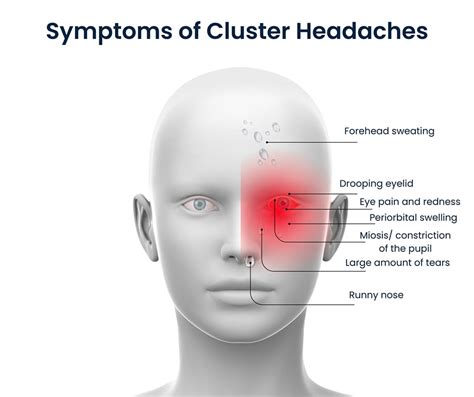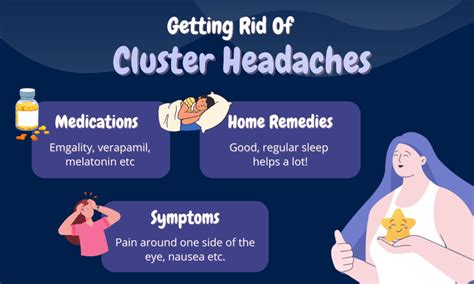Intro
Find effective cluster headache medication relief options to alleviate excruciating pain. Discover prescription treatments like triptans, corticosteroids, and ergotamines, as well as alternative therapies like oxygen therapy, acupuncture, and herbal remedies. Learn how to manage and prevent cluster headaches with lifestyle changes and natural remedies.
Cluster headaches are a type of headache disorder known for their excruciating pain and debilitating effects on daily life. These headaches are characterized by severe, one-sided pain that is often described as burning or piercing, and can be accompanied by symptoms such as tearing, redness, and swelling of the affected eye. For individuals suffering from cluster headaches, finding effective medication relief options is crucial to managing their symptoms and improving their quality of life.
The challenge of treating cluster headaches lies in their unpredictable nature and the fact that they can be resistant to many conventional pain-relieving medications. However, there are several medication options available that can provide relief from cluster headache symptoms. In this article, we will explore the different types of cluster headache medication relief options, including their benefits, potential side effects, and how they work to alleviate symptoms.
Understanding Cluster Headaches

Before delving into medication relief options, it's essential to understand the underlying causes and mechanisms of cluster headaches. Research suggests that cluster headaches are related to abnormalities in the body's internal clock, which regulates the release of certain hormones and neurotransmitters. This can lead to an imbalance in the levels of serotonin, a neurotransmitter that plays a crucial role in pain modulation.
Pathophysiology of Cluster Headaches
Cluster headaches are thought to involve the activation of the trigeminal nerve, which is responsible for transmitting pain signals to the brain. This activation can lead to the release of inflammatory mediators, such as histamine and bradykinin, which contribute to the development of headache symptoms.
Medication Relief Options for Cluster Headaches

There are several medication options available for the treatment of cluster headaches, including:
Triptans
Triptans are a class of medications that are specifically designed to target the serotonin receptors in the brain. They work by constricting blood vessels and blocking pain pathways, which can help to alleviate headache symptoms.
- Examples of triptans include:
- Sumatriptan (Imitrex)
- Rizatriptan (Maxalt)
- Zolmitriptan (Zomig)
Corticosteroids
Corticosteroids are powerful anti-inflammatory medications that can help to reduce swelling and inflammation in the body. They are often used to treat cluster headaches during periods of high frequency or severity.
- Examples of corticosteroids include:
- Prednisone (Deltasone)
- Dexamethasone (Decadron)
Ergotamines
Ergotamines are a class of medications that work by constricting blood vessels and blocking pain pathways. They are often used to treat cluster headaches, particularly those that are resistant to triptans.
- Examples of ergotamines include:
- Ergotamine tartrate (Ergomar)
- Dihydroergotamine (Migranal)
Oxygen Therapy
Oxygen therapy involves breathing in pure oxygen through a mask or nasal tube. This can help to increase oxygen levels in the body and reduce inflammation, which can contribute to headache symptoms.
Other Medications
Other medications that may be used to treat cluster headaches include:
- Anti-seizure medications, such as topiramate (Topamax)
- Anti-depressant medications, such as amitriptyline (Elavil)
- Muscle relaxants, such as cyclobenzaprine (Flexeril)
Benefits and Potential Side Effects of Cluster Headache Medications
While medication relief options can provide significant benefits for individuals with cluster headaches, they can also have potential side effects. It's essential to discuss the benefits and risks of each medication with a healthcare provider to determine the best course of treatment.
Benefits
- Quick relief from headache symptoms
- Reduced frequency and severity of headaches
- Improved quality of life
Potential Side Effects
- Triptans:
- Nausea and vomiting
- Dizziness and lightheadedness
- Tingling or numbness in the face or extremities
- Corticosteroids:
- Weight gain and mood changes
- Insomnia and restlessness
- Increased risk of infections
- Ergotamines:
- Nausea and vomiting
- Dizziness and lightheadedness
- Tingling or numbness in the face or extremities
Lifestyle Changes and Alternative Therapies

In addition to medication relief options, lifestyle changes and alternative therapies can also play a crucial role in managing cluster headache symptoms.
Lifestyle Changes
- Establishing a regular sleep schedule
- Avoiding triggers, such as certain foods or environmental factors
- Engaging in stress-reducing activities, such as meditation or yoga
- Maintaining a healthy diet and staying hydrated
Alternative Therapies
- Acupuncture
- Massage therapy
- Chiropractic care
- Herbal supplements, such as feverfew or butterbur
Conclusion
Cluster headaches are a complex and debilitating condition that can significantly impact an individual's quality of life. While medication relief options can provide significant benefits, it's essential to discuss the benefits and risks of each medication with a healthcare provider to determine the best course of treatment. By combining medication relief options with lifestyle changes and alternative therapies, individuals with cluster headaches can find relief from their symptoms and improve their overall well-being.
We hope this article has provided you with a comprehensive understanding of cluster headache medication relief options. If you have any questions or comments, please feel free to share them below.
What is the best medication for cluster headaches?
+The best medication for cluster headaches depends on the individual and the severity of their symptoms. Triptans, corticosteroids, and ergotamines are commonly used to treat cluster headaches. However, it's essential to discuss the benefits and risks of each medication with a healthcare provider to determine the best course of treatment.
Can lifestyle changes help alleviate cluster headache symptoms?
+Yes, lifestyle changes can play a crucial role in managing cluster headache symptoms. Establishing a regular sleep schedule, avoiding triggers, and engaging in stress-reducing activities can help alleviate symptoms.
Are there any alternative therapies that can help treat cluster headaches?
+Yes, alternative therapies such as acupuncture, massage therapy, and chiropractic care may help alleviate cluster headache symptoms. Additionally, herbal supplements like feverfew and butterbur may also be beneficial.
